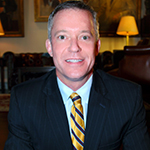
Philip C. Berg
Member, Otterbourg P.C.
Biography:
Phil was born and raised in western Wisconsin in a close-knit family of seven. He received a bachelor degree in chemistry from the University of Virginia, working summers at the U.S. Naval Research Laboratory doing research in molecular electronics, the precursor of today’s quantum computing. He then received a law degree from Harvard Law School, clerked for the Chief Judge of the U.S. Court of Appeals for the Second Circuit, and then began his corporate law career at Cravath Swaine & Moore in Manhattan.
After Cravath, he structured and negotiated M&A transactions for KKR’s PRIMEDIA, and ultimately chose Otterbourg P.C. as his career home almost a decade ago. Phil is currently Chairman of Otterbourg’s Corporate Department and Chairman of the firm’s Privacy and Cybersecurity Practice. His practice is primarily focused on corporate finance, mergers & acquisitions and corporate securities.In addition, he has led Otterbourg’s push into the emerging fintech areas of distributed blockchain technology, smart contracts and digital assets. Phil is currently working with members of the U.S. House Financial Services Committee on bipartisan legislation to provide regulatory certainty in these emerging fields.
Tell us more about your involvement in leading Otterbourg’s push into the emerging fields of blockchain-based smart contracts and digital assets.
I was initially made aware of how these technologies were on a path to disrupt certain areas of finance and law from our Privacy and Cybersecurity Practice work. In addition, existing and prospective corporate clients were inquiring about tokenized securities offerings, and Otterbourg’s bank and lending clients were inquiring about secured lending on digital asset collateral. We knew we had to get out ahead of this curve, and with my science and math background, I was well positioned to lead the way.
We have since worked with clients on matters such as exempted securities token offerings, asset tokenizations and smart contract programming agreements. My colleagues and I have also worked with federal legislators and regulators to help assure that these industries prosper in the United States, where blockchain assets currently face regulatory uncertainty and inconsistency, not only among Federal regulators (SEC, CFTC, IRS, FTC, etc.) but among the 50 states. A big part of our effort involves publishing articles and educating policymakers, since only a small proportion of them understand the underlying technology, and thus its implications. Otterbourg had an important role in crafting the proposed federal Token Taxonomy Act, in particular the preemption provisions that are designed to dramatically reduce interstate and interagency regulatory inconsistencies.
Please discuss another organization you are involved with and why its mission is important to you.
In addition to my “day job”, I am on the Board of Directors and the Treasurer of The Players, a 131-year old social club founded by Shakespearian actor Edwin Booth, Mark Twain, Stanford White, Nikola Tesla and others, which is still in its original clubhouse on Gramercy Park. The club’s chartered purpose is to mix those in the theatre arts with professionals in other fields, such as law. I initially joined The Players when it was having financial difficulties and needed financing. On a pro bono basis, I worked with a lender to creatively work around certain deed restrictions, leading to a successful financing and bringing the club back to financial stability.
The Players—and the relationships I have developed over the years there—has “given back” by deeply enriching my life. After a long day of negotiating corporate agreements and transactions, it is refreshing to share a drink with Jimmy Fallon or discuss art with Everett Raymond Kinstler. In fact, I recommend that all bankers and lawyers regularly mix with those in the creative arts.
What advice would you give to people who want to give back but, aren’t sure how to select which charities or organizations to dedicate their time to?
I try to be active with at least one humanitarian organization, one arts organization and one professional organization at all times. Think about what you care about in each of these fields, then volunteer. Sample before you select the organizations with which you want to do a deeper dive. Although this may all sound very time-consuming, with most non-profit organizations it is not. And the rewards are well worth it.
Tell us something about yourself that may surprise people.
President Barack Obama and Justice Neil Gorsuch are both friends from my graduating class at Harvard Law School. Turns out that one of them was and remains among my closest friends, and in fact was the very first person to whom I came out as gay decades ago. People who know me and my Democratic-leaning politics are usually the most surprised to learn that it is Neil who is that close friend.
Professional Development Courses
- Live online classes for ABL and Factoring professionals
- On Demand classes in Appraisals, Factoring, Legal, Workout & Bankruptcy
Learn More

.jpg?sfvrsn=f1093d2a_0)